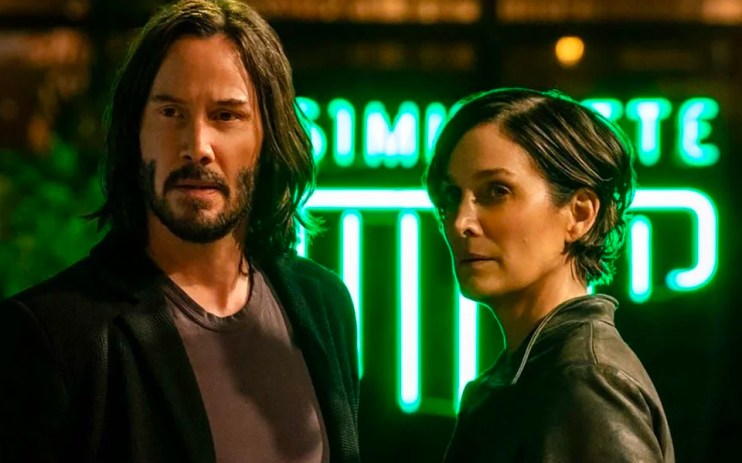The Matrix Ressurections: Just take the Blue Pill and skip this one

You might be wondering why the long-awaited return of The Matrix is being released midweek, a few days before Christmas, lost in the shadow of Spider-man. While people of a certain age will remember the 1999 original as a game changer, 2003’s The Matrix Revolutions ended the trilogy on a sour note, with a historically lacklustre ending that saw most of the characters you loved dead or broken.
There are notable absences for this reboot: original co-director Lilly Wachowski, who declined to be involved; villain Hugo Weaving, who cited scheduling conflicts; and star Laurence Fishburne, who wasn’t asked to return. Finally, it’s the last film in the infamous Warner Bros/HBO Max deal, a pact that has seen the sequels for Suicide Squad and Space Jam bomb along with a Sopranos prequel and Will Smith drama King Richard. You don’t need The Oracle to see the signs aren’t promising.
Still, in Keanu we trust. The world’s most likeable star returns along with Carrie Anne Moss and director Lana Wachowski, along with a raft of exciting new additions. The new story centres on Thomas (Reeves), a celebrated game developer known for his epic trilogy of games, titled The Matrix (stay with me). On the verge of developing the fourth game in the series, Thomas is haunted by visions, and a familiar face in a coffee shop (Moss). Suddenly, he is contacted by people from the outside world, who try to tell him that he is once again in The Matrix, and they have come to set him free. Thomas, or Neo, must once again make the decision: Blue Pill or Red Pill?
The first hour is a meta carnival, filled with self-referential nods to a fourth Matrix story (Warner Bros is even namedropped). It’s a smart examination of the cyclical nature of blockbuster culture, a choice to knowingly embrace that this is a needless sequel both propelled and suppressed by nostalgia for the first film. Taking Hollywood’s Red Pill, if you will, sets it apart from the numerous reboots that have advertised old as new.
However, is a retread any less galling if it’s self-aware? The characters practically wink at the camera and talk about how this all happened before, but such awareness implies that, at some point, the script will be flipped, a white rabbit pulled out of the hat. Yet after a creative first hour comes a plot that largely mirrors the first film’s rescue mission and path to realisation. Situations are tweaked, set pieces are different, but it’s undoubtedly a rehash, with the meta elements meaning you can’t even delude yourself that it’s just like the old days.
Even when the story went south, the original trilogy’s action scenes set the bar. Aside from signature elements like Bullet Time, there were also vast, ambitious sequences such as the foyer shoot-out in the first film, or Reloaded’s car chase (for which an entire highway was constructed). Maybe, as the script implies, time has simply moved on, but there’s no particular action scene this film can hang its hat on. Yes, there is an intellectual element to this universe, but the thing that made people get in line were the Western-infused showdowns and leaps of faith. At one point, a team of programmers debate whether the appeal of The Matrix was subversion or badassery. Is it too much to ask for both? As intelligent as the plot can be, it’s not all that fun.
There is some delight to be found in the movie’s villains, namely Neil Patrick Harris and Jonathan Groff. The acid-tongued, occasionally camp antagonists work toward different ends but understand what made Hugo Weaving such a cult figure as Agent Smith: menace, with a little bit of a smirk. Groff slides effortlessly into the world, while Harris dominates the final act with a cackling baddie routine that is clearly intended to be a satire of the Alt-Right (there’s talk of “sheeple”, and the difference between “thoughts and feelings”).
As for the good guys, it’s a mixed bag. Jessica Henwick’s space captain Bugs is a tough, uncompromising hero, while Yanya Abdul-Mateen II’s alternate Morpheus does a fine job of balancing his predecessor’s presence with a playful streak. But neither are given much to do other than assist Neo. Jada Pinkett Smith appears in dreadful prosthetics to resume her role as Niobe, a role that’s significant only as an authority figure to butt against once Neo gets to the real world.
Reeves, as ever, is excellent. It’s why Bill and Ted came back, it’s why Neo’s back, and it’s why he’ll be making John Wick movies until doomsday – the guy is just fun to watch. While his ageless qualities are well known, it’s staggering that Moss also doesn’t seem to have aged in the time since she last donned the sunglasses. Her Trinity doesn’t really come into her own until the final act, and while that’s gratifying to see, the film might have felt fresher if she had more of a direct role.
At one point, Groff sneers “Just like old times” at Neo, and The Matrix Resurrections makes no bones about its intention to play the hits. The fourth film benefits from being more coherent than the previous two, but the series that once made you grip your seat with excitement feels worn and reflective. It is to Wachowski’s credit that she found a way to credibly bring this world back to life, but to quote another blockbuster, the filmmakers were so preoccupied with whether they could, they didn’t stop to think if they should.